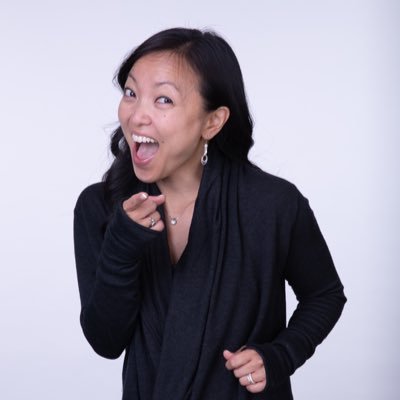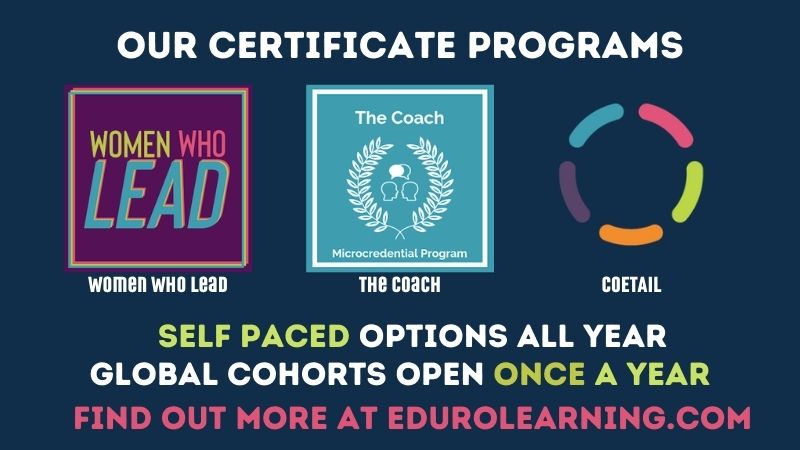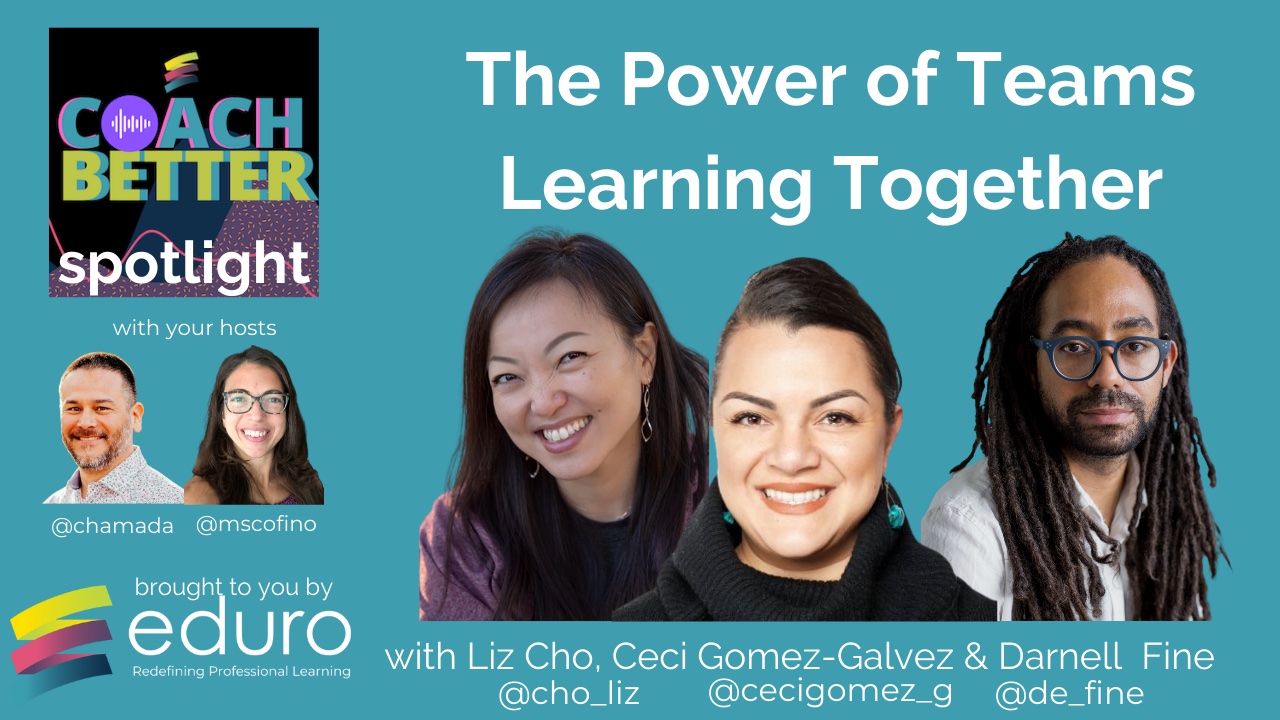In this episode of #coachbetter, we have a special panel episode featuring Ceci Gomez-Galvez, Liz Cho, and Darnell Fine. Ceci & Liz recently participated in our MastermindEd course: “Culturally Responsive Leadership” created & facilitated by Darnell Fine and Renee Green. Both Ceci and Liz joined the course with a large team from their respective schools, and the impact of learning together, as a school team, continues to have a big impact in their school setting. This conversation was an opportunity to see how Ceci and the team at Saigon South and Liz and the team at Korea International School, have been implementing their learning within their school context.
This episode provides a real inside look into how schools are leveraging team-based online learning combined with face-to-face conversations and implementation to make large-scale change. If you are curious about how or why you would want to bring a team to an online learning experience, or how schools are actively implementing culturally responsive leadership, this episode is for you!
Subscribe to #coachbetter via your favorite Podcast Player!
Featured Guests



Bonus! Watch the Spotlight Version on YouTube!
Show Notes
Ceci: There’s nothing more empowering than for your passions about advocacy and representation and the work of diversity, equity, inclusion, and cultural responsiveness to be acknowledged by people that you really respect and people that, that also do the same kind of work and find you inspirational and you find inspiration in others. And this is what this forum really did. I agree with Liz too, that I think Darnell kind of like held our hand the way that it should have been done in this course, because it is a kind of, it has to be a self led force then, and that is one of the beautiful things that we’re finding about online learning right now is that it’s more like a journey rather than a party, necessarily a participation in that, oh, I have homework and I have to do this. It’s more like a journey that you’re taking now in a self-pace, the one where you can take your time to reflect and think and reflect again.
I wish I could tell you everything that has happened behind the scenes of this work and the conversations that we’ve had with our DDI group, with our collaboration with Dr. Catriona Moran, who is my Head of School, and I couldn’t even feel prouder that she was part of it. Our Associate Head of School, David Chadwell was also part of it. And we had, just the collection of people from different divisions in our school that are part of the DEI course, or sorry, GI group that we have at our school that joined the course. And then the conversations we actually had to stand, like sit in front of each other, talk about the things that we posted, the things that we were vulnerable enough to share and courageous enough to share, not really knowing like Liz says, you know, we don’t do things just because we want other people to see them.
All of this that has sparked a lot of this work is actually being embedded into our strategic plan. And I should probably tell you that has been the impact that it’s had this, these conversations that they have actually, we thought about empowered the embed, this language and this, these kinds of like, I know that we’re not forcing or pushing people. There’s certainly an expectation like Darnell says, you know, when we pick the teachers that we want to work at our students and the educators, we expect them to excel at the things that they should be experts in. And this is one thing that our school is going to be holding others accountable to also know about, to also participate in the conversation. Nobody has to be an expert yet, but be willing to learn together.
Darnell mentioned before also disruption. And I was like, this is the beautiful thing about disruption is the right kind of disruption is the kind of disruption where you want to kind of take a deep breath and feel a little funny, you know, feel a little bit of butterflies in your stomach, because when you are going to respond, when you’re going to engage, it takes you out of the comfort zone. You are going to have to – it’s critical work. Like I said, it’s imperative right now. And, I also appreciate Carmen, please do send my best to her. Listen, she is wonderful.
And they do have to say, we gotta, we gotta look to our younger teachers, to our teachers that are coming with this, like wokeness. I love it. This passion, they, they have experienced, their educational learns like later years and their higher education, a little bit different than we have that. We’re a little bit older. And I have had some phenomenal conversations with our younger, newer staff where I have been, I have even gone. Like I hadn’t even thought about that. I hadn’t even thought about that in that I hadn’t even thought about looking at our curriculum or the learning in our, in our classrooms that way. And, and it has all really sparked has, Dr. Moran and David and just the leaders. And this is why I appreciate people in leadership like Liz, who will make the space for these things to happen.
There are, I mean, even in Asia, where we tried to have a conversation about this a few months ago or last year, and, and we, we had questions and it was, and it was great. We did have some people who said, I don’t know if I’m ready to engage in this conversation online and on Twitter. And I understand that the government has to be vulnerable. It’s a big deal and it is disruptive and it is critical. And it is all of these things that we’re saying. So for a school, the leaders of the school to say, I will invest professional development, money and funds. I will invest time. I will invest my own perspective and vulnerability to see this all together. And to me make it become part of this bigger piece of work that is going to define the identity of her school in the next decade.
I mean, talk about impact. Like that is the epitome of like, of this kind of work, but it has to be like somebody licking a domino and then everything starts falling into place. And then you see this beautiful thing being created. and I feel like being part of this course, really some other, some of the parts that we have, some of the things that we shared, like the first document that talks about the origin, from the foundations, I guess, of like white supremacy practices, like just saying the words, white supremacy in a, in a room of educators, it does spark that kind of like, whoa, what are we going to talk about And, oh, and I don’t know what this is going to be a little awkward. It’s a little nerve-wracking, but there’s light at the end of that tunnel.
Liz: I think studying, really clarifying one of our major goals for next year to be one, and so one of the very, a couple of the concrete things, we have built it into the teacher evaluation process that, this whole question about this and how you’re going to be more culturally responsive and what your goal is regarding that is built into that system. And it was wonderful to have, obviously, as I mentioned, the middle school principal, Jim there, as he has been on the committee to know a committee that was really driven by teachers to look at like, what do teachers need, you know, when, when, administrators come in and have observations within and give them feedback. and so it was really a no-brainer. If we really say that this is one of those school goals, then, we build it in. We refine that so that they know that it’s there and it’s very explicit.
Kudos to my middle school admin team for supporting that and saying, you know, what, everything that we’ve been talking about and heard makes sense. So there’s something that’s another concrete thing that is happening, from that and from the teachers are in the course and being able to, really very, you know, anxiously like I’m, I don’t know how to bring this up and then, but I could say, Hey, do it, I’m here to support you. Let’s say I have this conversation and I could put it in documents that people need people when they were taking, you know, their, glances and review. They could look at it and really go, huh. That’s interesting. so we’re really hoping that that continues. and we’re continuing this work after Darnell worked with us, a lot of questions came up, particularly for our school context we’re an international school in Korea. So how do we connect that BLM to history, to all of these things that we’re talking about in the white supremacy? How is, does that connect to our context now with a lot of high population of Korean students, Asian students? What does this mean in Asia? And so within that, we tapped into Dr. Josephine Kim. So that’s another PD that we’re continuing on and we have a whole community work. That’s the beginning.
Level Up Your Impact with Our Certificate Programs
There are so many ways to make an impact in your school community. If you’re looking to level up your impact, either as a school leader, a coach or a teacher, explore our certificate programs: Women Who Lead, The Coach, and COETAIL. Or, if your goal is truly unique, register for a private mentoring package. If any of today’s post resonated with you, join us for the next cohort of WWL, The Coach or purchase a private mentoring package! Registration for our global cohorts opens once a year, make sure you’re on our mailing list to be notified as soon as they open! You can find all of these learning opportunities on the our website!






Recent Comments